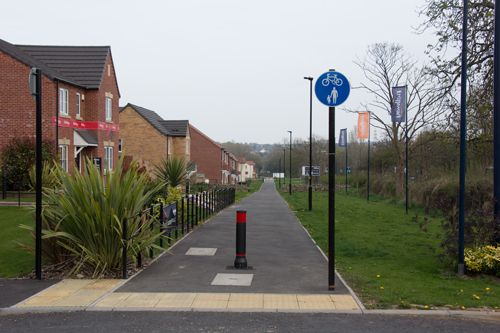Active Travel England to be Consulted on Planning Applications from Today

From today, 1st June 2023, Active Travel England (ATE) will be consulted on all large planning applications. This follows a pilot project where ATE worked with 30 local authorities on 60 developments up to November 2022.
ATE becomes a statutory consultee in the planning process for developments of:
- 150 or more houses
- 7,500m2 or more of floorspace or
- an area of 5 hectares or more

This means ATE will review around 3,100 planning applications a year, or around 60% of new housing developments.
In ATE’s statutory role it will help planning authorities to implement good active travel design, ensuring walking, wheeling and cycling connectivity to schools and local amenities.
Building in active travel at the design stage will avoid big increases in vehicle traffic and reduce the need for costly upgrades to major road junctions.
Chris Boardman
Active Travel Commissioner Chris Boardman said:
‘Active travel is essential to improving public health, reducing emissions and tackling the cost of living crisis. That’s why we’re working to ensure millions more people have the opportunity to walk, wheel or cycle from their doorstep to where they need to be.
Designing activity back into our neighbourhoods and creating places where children have transport independence is achievable – it just needs smart planning.
As a statutory consultee ATE will work with planning authorities and developers to help them ensure new estates give people what they need to get fresh air and exercise, save money on petrol and help fight climate change.’
active travel commissioner chris boardman
No Statutory Powers
Although ATE will be consulted, it has no statutory powers to direct the outcome of planning applications.
Nevertheless, this new development could be a game-changer for new developments.
Planning Application Assessment Toolkit
ATE has provided a Planning Application Assessment Toolkit. To accompany the Toolkit, there’s a User Manual.
The Assessment Toolkit guides local authorities through the assessment of planning proposals against active travel policy requirements and technical guidance. This includes Manual for Streets, the National Model Design Code, Inclusive Mobility and LTN 1/20. There will also be an ATE Standing Advice Note on active travel and sustainable development.
The Toolkit point councils towards standards such as:
- when people cycling can mix with traffic, or where separation is needed
- geometrical requirements of infrastructure
The central element of the Toolkit is a Checklist with 31 criteria; using the Checklist is the standard approach to assessing planning applications. (A Full Assessment should be done instead of the Checklist in the preparatory stages of an urban expansion).
For example, one item on the Checklist is ‘cycle routes to key destinations’.

If there are no existing or future planned LTN 1/20-compliant cycle routes to key destinations, that is a fail on that criterion; if there are, the proposed development gets a pass.
The Checklist leads to an Appraiser Report, with Summary, General Comments and Next Steps.
Procedural Note
A Procedural Note explains how ATE will carry out its role in the planning system, with a view to ensuring that walking, wheeling and cycling are the preferred choice for everyone to get around.
It notes (para 1.12) that ATE will have a process to prioritise certain planning applications for a bespoke assessment. This can result in a recommendation to impose conditions or to refuse the planning application (1.35).
There will be an early engagement pre-application consultation service for councils (1.17) and a pre-application consultation service for developers (1.18).
There is a special email address for planning consultation emails (1.19), and another for general planning-related enquiries (1.20).
ATE’s main contact will always be the local planning authority’s case officer (1.28).

